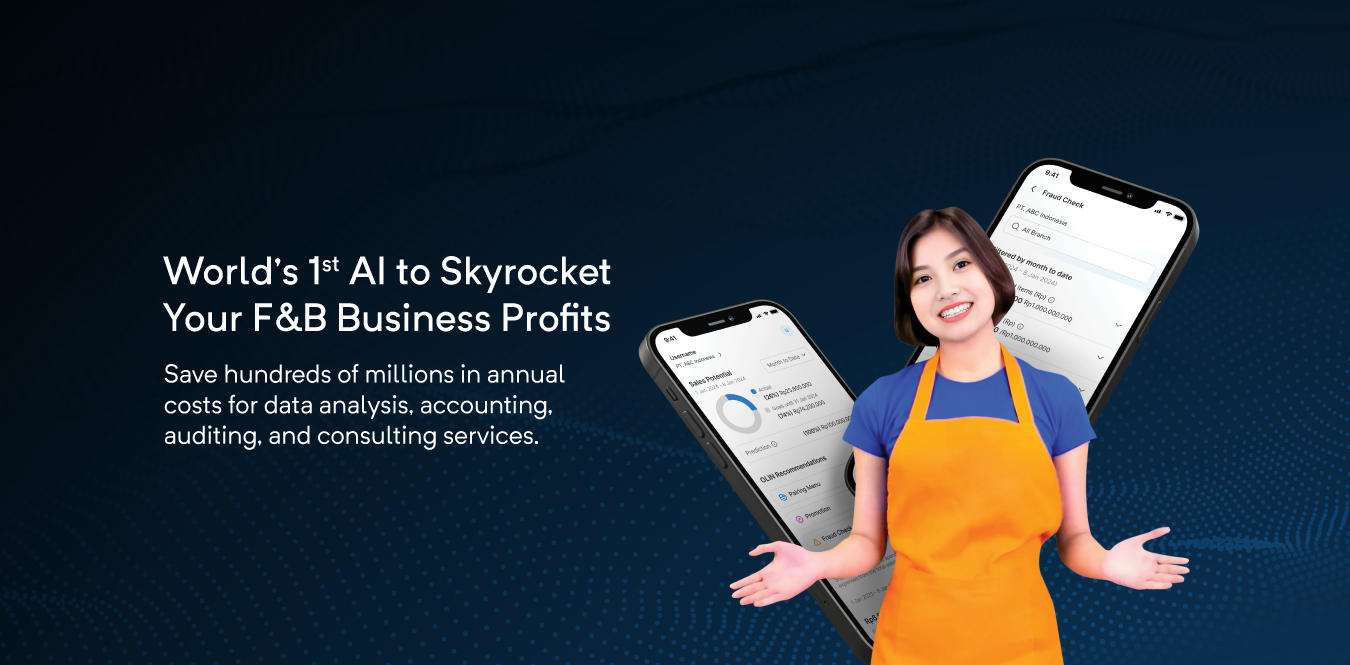 SHARE
SHARE
#BebasCemas: A Cashier Application Solution for a More Efficient F&B Business
Febbi S
The F&B industry comes with many challenges that can cause anxiety for entrepreneurs or F&B business owners.
From manual bookkeeping and order recording errors to skyrocketing operational costs, these issues can be overwhelming.
However, all these problems can now be solved with an innovative and integrated cashier application.
What is ESB?
ESB specializes in integrated operational systems for culinary businesses, offering services ranging from cashier management, raw material stock tracking, and AI-powered financial reporting to funding solutions for businesses of all sizes.
Trusted by over 30,000+ merchants across Indonesia and Southeast Asia, ESB is the No. 1 integrated F&B ecosystem, providing complete solutions to support culinary business operations—from order management to data analysis—helping merchants enhance efficiency and profitability.
Sign Up for ESB POS & Contact the ESB Team Now!
Why Do F&B Entrepreneurs Need the Right Cashier Application?
Without an organized system, F&B businesses may face various challenges that hinder growth, along with the stress of managing operations, finances, and customer satisfaction. Some of the most common challenges include:
1. Fraud
Many F&B businesses face fraud risks due to loopholes in their POS system. Cashiers may exploit the void feature to divert funds from canceled orders or process transactions on open tables without detection.
Additionally, the lack of control over order cancellations makes it difficult for business owners to monitor transaction misuse, potentially leading to significant financial losses.
With an OTP feature for every order cancellation, only authorized personnel can access it, while a real-time dashboard enables direct transaction monitoring, preventing potential cashier fraud.
2. Order Recording Errors
Order recording mistakes can harm businesses and lower customer satisfaction. Without an integrated system, orders can get mixed up, delayed, or even forgotten, especially when handling in-house dining, online orders, and deliveries simultaneously.
With a centralized system in ESB POS, operations become more efficient, and customers receive faster service.
Orders are automatically recorded and directly linked to the kitchen, reducing the risk of miscommunication.
3. Manual Data Recording & Processing
Manually managing orders, stock, and invoices is time-consuming and prone to errors.
Without automation, operations slow down, labor costs increase, and customers have to wait longer, negatively impacting satisfaction.
With ESB POS, all data is automatically recorded and easily analyzed. You can save time, reduce errors, and run your business more efficiently, ensuring faster and smoother customer service.
4. Manual Inventory Management
Managing stock manually often results in raw material imbalances—either excessive waste due to overstocking or shortages during peak hours.
Without an integrated system, ordering raw materials becomes a guessing game, leading to order delays, kitchen chaos, and dissatisfied customers.
The inventory management feature in ESB Core ensures all stock is automatically recorded and always monitored.
With a cloud-based system, you can track raw material availability across multiple locations, easily manage stock transfers, and prevent waste.
The result? More efficient operations, smooth kitchen workflow, and satisfied customers.
5. Poor After-Sales Service & Slow Response
Many restaurant businesses suffer from slow and unresponsive POS after-sales service, causing difficulties when facing technical issues like system errors or transaction recording mistakes.
Disruptive system updates, high maintenance costs, and lack of integration with other systems further add to the challenges.
ESB POS offers responsive after-sales support to ensure smooth business operations.
A cloud-based system secures data, while automatic updates and seamless integration with ESB Core (ERP) and ESB Order improve efficiency.
Register for ESB POS & Contact the ESB Team Now!
6. Rising COGS (Cost of Goods Sold)
Without an integrated POS system, sales, expenses, and stock records can become disorganized.
For example, in a bistro that still records transactions manually, staff may only note total sales and expenses without considering crucial details like raw material costs or best-selling menu items.
This lack of accurate data makes it difficult for business owners to calculate actual profits. As a result, pricing mistakes may occur, profit margins shrink, and cost-saving opportunities are missed.
With a structured and accurate recording system, business owners can better control production costs and set optimal pricing strategies.
A cashier application that automatically calculates Cost of Goods Sold (COGS) ensures business profitability remains stable.
7. Manual Recipe Management
In the competitive F&B industry, menu updates are inevitable. Trends are always changing, and customers constantly seek something new.
However, without an integrated POS system, managing menu changes becomes complex and prone to errors.
For example, every time a new menu or recipe change occurs, staff must be informed manually. Physical menus need reprinting, online listings must be updated, and raw material orders must be adjusted.
Any mistakes or omissions can cause confusion in both the kitchen and dining area. With the Bill of Materials (BoM) integrated into ESB POS, every recipe change is automatically updated.
All operational aspects—from inventory management to ordering processes—adapt seamlessly, ensuring a smoother process, more accurate orders, and enhanced customer experience.
8. Unaccounted Raw Material Loss
Losing stock without any clear reason is a major challenge for many F&B business owners. Studies show that 75% of employees admit to taking items from their workplace.
Without a real-time stock monitoring system, discrepancies between recorded and actual inventory can go undetected. These discrepancies may stem from recording errors, uncontrolled food waste, or even theft.
Without the right system, business owners may only realize the problem when stock suddenly runs out or raw material costs surge.
With the ESB Core integrating POS and inventory features, all raw materials are tracked in real-time. Every transaction is recorded instantly, enabling clear stock movement visibility, early discrepancy detection, and unnecessary loss prevention.
9. High Labor Costs
Manually managing a restaurant often requires hiring additional staff to handle various operational tasks— from cashiers processing orders and payments manually to inventory staff tracking stock manually and accountants managing bookkeeping and payroll.
The more workforce required, the higher the operational costs. Additionally, an imbalance in staffing—overstaffed during slow hours or understaffed during peak times—can lead to rising expenses and shrinking profits.
With the ESB system, many manual tasks can be automated. Ordering, payment processing, and stock tracking become faster and more accurate, reducing reliance on manual labor. The result? Increased operational efficiency, controlled labor costs, and optimal restaurant profitability.
10. Inefficient Operations
Without a connected system, coordination between divisions can be slow and disorganized.
Scheduling shifts, training new employees, and monitoring team performance become more challenging when done manually. This can lead to schedule conflicts, staff shortages during peak hours, or excess staff during quiet times.
Additionally, manual payroll and record-keeping complicate operations, increasing the risk of errors and consuming valuable time that could be used for business growth.
With a cashier application connected to an ERP system, all processes become smoother and more structured.
From staff management to performance monitoring and financial tracking—everything is accessible in a single system, making operations more efficient and optimizing business performance.
The UMKM Ecosystem from ESB to Support Culinary Businesses
11. Manual Bookkeeping
Manual bookkeeping wastes time on transaction recording, inventory management, and financial reporting.
Human error risks increase, impacting profit-loss calculations and business decision-making.
With ESB's ERP system, every transaction is automatically recorded, financial reports are more accurate, and operations become more efficient. Fewer mistakes mean more time to focus on business growth!
12. Difficulty Determining COGS
Calculating the Cost of Goods Sold (COGS) without a clear system is challenging for F&B business owners.
Without accurate data, raw material, operational, and profit margin calculations can be off, leading to incorrect pricing and reduced profits.
ESB POS offers an automatic cost analysis feature that simplifies accurate COGS calculation. With real-time and integrated data, you can set the right selling price, maintain profitability, and make smarter business decisions.
13. Outdated Technology
Relying on traditional methods slows down operations and reduces efficiency. Menu changes require multiple manual adjustments, transaction records are scattered, and stock is difficult to monitor in real time.
With modern POS system, all operational changes synchronize instantly, ensuring faster, more accurate processes with minimal disruptions.
Try ESB POS & Contact the ESB Team Now!
14. Difficult to Find a Reliable Supplier
Without an integrated system, managing suppliers can be complicated. Orders may arrive late, raw materials may be delivered incorrectly, or payment errors may occur. Without clear data, opportunities to secure better prices and streamline the supply chain can be missed.
With ESB Goods as a Supplier Management feature, finding and managing suppliers becomes easier. Track orders, manage invoices, and ensure raw materials are always available at the best prices—all within a single system!
15. POS and ERP Applications Are Not Integrated
Using separate systems can slow down operations and increase the risk of errors. Sales data, inventory, and financial reports are not synchronized, making it difficult for businesses to grow efficiently.
With a POS application integrated with ERP, all operational aspects can run more smoothly, ensuring an optimized and easily managed business.
16. Data Is Not Secure
Without a reliable security system, business data is vulnerable to loss or breaches. Unencrypted transactions can become an entry point for information misuse.
Using a cloud-based POS application ensures all data is securely stored, encrypted, and always accessible without the risk of loss. With enhanced security, businesses can operate with peace of mind!
Read more: ESB's Superior Products for Culinary Business
#BebasCemas with ESB POS Application
To ensure your F&B business runs smoothly without worries, ESB's POS application offers an integrated, innovative, and secure solution.
With advanced features such as stock management, automated transaction recording, and real-time financial analysis, ESB helps F&B entrepreneurs operate their businesses more efficiently.
Now is the time to switch to the right POS application and enjoy #BebasCemas in managing your F&B business! Contact the ESB Team now!
 SHARE
SHARE





